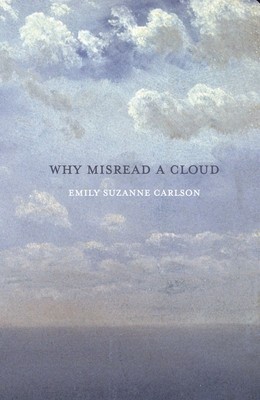
- We will send in 10–14 business days.
- Author: Emily Suzanne Carlson
- Publisher: Tupelo Press
- ISBN-10: 194648279X
- ISBN-13: 9781946482792
- Format: 12.7 x 20.3 x 0.3 cm, minkšti viršeliai
- Language: English
- SAVE -10% with code: EXTRA
Reviews
Description
Winner of the Sunken Garden Chapbook AwardWhy Misread a Cloud takes its name from clouds of ash and smoke in wartime which appear to the author as a "storm, blown over the sea." Both an exploration of the mind's ability to turn what is into something else, in order to survive, and the mind's ability to resist the effects of psychosocial warfare-imposed by the military and the police. "Who wants you to be afraid" the poet's friend asks as he "added sugar to his tea." The realization this question brings enables the poet to explore forces that separate us from one another and ways we rise up within ourselves to move through fear toward love.
"'I needed only to let the curtain fall' Carlson writes in the introduction to her searing and tender poems, acknowledging at the outset her skin privilege to not see state-sponsored violence-the atrocities of Lebanon's 2006 war as it unfolds around her, merging, decades later, with the atrocities of police violence against her Black neighbors at home in Pittsburgh's East Liberty. Carlson's poems enact the very opposite of not seeing, framing fragments of testimony in high relief: Black families sirened from sleep, an Israeli machine gunner's face in close-up, aftermath of oil pouring into the sea. 'Would you call it war or invasion?' she asks, a question initially applicable to either scene, 'My neighbors empty-handed in the street...' In the empty hands is gentleness too as, elsewhere, a child lifts dolls through a missing door, or Marvin Gaye's voice drifts above the poised rifles in police raid. Details of time and place repeatedly slip into a singular nightmare that haunts the narrator, yet she does not turn away. In exacting, sensorial language Carlson illuminates the heightened edges that trauma and love evoke, asking us to bear witness with her, while centering a question: 'whose evacuation, whose drinks on a silver tray, whose mountain, whose moon.' The question, unanswered, hangs in the page's white space. This is powerful, wrenching work whose every line makes me feel my heart, want to see."
-Meg Shevenock, Author of The Miraculous, SometimesEXTRA 10 % discount with code: EXTRA
The promotion ends in 22d.14:53:12
The discount code is valid when purchasing from 10 €. Discounts do not stack.
- Author: Emily Suzanne Carlson
- Publisher: Tupelo Press
- ISBN-10: 194648279X
- ISBN-13: 9781946482792
- Format: 12.7 x 20.3 x 0.3 cm, minkšti viršeliai
- Language: English English
Why Misread a Cloud takes its name from clouds of ash and smoke in wartime which appear to the author as a "storm, blown over the sea." Both an exploration of the mind's ability to turn what is into something else, in order to survive, and the mind's ability to resist the effects of psychosocial warfare-imposed by the military and the police. "Who wants you to be afraid" the poet's friend asks as he "added sugar to his tea." The realization this question brings enables the poet to explore forces that separate us from one another and ways we rise up within ourselves to move through fear toward love.
"'I needed only to let the curtain fall' Carlson writes in the introduction to her searing and tender poems, acknowledging at the outset her skin privilege to not see state-sponsored violence-the atrocities of Lebanon's 2006 war as it unfolds around her, merging, decades later, with the atrocities of police violence against her Black neighbors at home in Pittsburgh's East Liberty. Carlson's poems enact the very opposite of not seeing, framing fragments of testimony in high relief: Black families sirened from sleep, an Israeli machine gunner's face in close-up, aftermath of oil pouring into the sea. 'Would you call it war or invasion?' she asks, a question initially applicable to either scene, 'My neighbors empty-handed in the street...' In the empty hands is gentleness too as, elsewhere, a child lifts dolls through a missing door, or Marvin Gaye's voice drifts above the poised rifles in police raid. Details of time and place repeatedly slip into a singular nightmare that haunts the narrator, yet she does not turn away. In exacting, sensorial language Carlson illuminates the heightened edges that trauma and love evoke, asking us to bear witness with her, while centering a question: 'whose evacuation, whose drinks on a silver tray, whose mountain, whose moon.' The question, unanswered, hangs in the page's white space. This is powerful, wrenching work whose every line makes me feel my heart, want to see."
-Meg Shevenock, Author of The Miraculous, Sometimes

Reviews